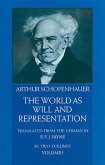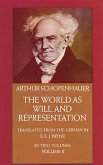The winning entry in a competition held by the Royal Norwegian Society of Sciences, Schopenhauer's 1839 essay brought its author international recognition. Its brilliant and elegant treatments of free will and determinism elevated it to a classic of Western philosophy, and its penetrating reflections still remain relevant.
Schopenhauer makes a distinction between freedom of acting (which he endorses) and the freedom of willing (which he refutes). The philosopher regards human activity as entirely determined, but he also posits that the variety of freedom that cannot be established in the sphere of human activity resides at the level of individuated will a reality that transcends all dependency on outside factors. Because the essay's clear and rigorous argument reveals many basic features of his thought, it forms a useful introduction to Schopenhauer for students of philosophy or religion.
Schopenhauer makes a distinction between freedom of acting (which he endorses) and the freedom of willing (which he refutes). The philosopher regards human activity as entirely determined, but he also posits that the variety of freedom that cannot be established in the sphere of human activity resides at the level of individuated will a reality that transcends all dependency on outside factors. Because the essay's clear and rigorous argument reveals many basic features of his thought, it forms a useful introduction to Schopenhauer for students of philosophy or religion.
Dieser Download kann aus rechtlichen Gründen nur mit Rechnungsadresse in A, D ausgeliefert werden.
Es gelten unsere Allgemeinen Geschäftsbedingungen: www.buecher.de/agb
Impressum
www.buecher.de ist ein Internetauftritt der buecher.de internetstores GmbH
Geschäftsführung: Monica Sawhney | Roland Kölbl | Günter Hilger
Sitz der Gesellschaft: Batheyer Straße 115 - 117, 58099 Hagen
Postanschrift: Bürgermeister-Wegele-Str. 12, 86167 Augsburg
Amtsgericht Hagen HRB 13257
Steuernummer: 321/5800/1497
USt-IdNr: DE450055826
Bitte wählen Sie Ihr Anliegen aus.
Rechnungen
Retourenschein anfordern
Bestellstatus
Storno









